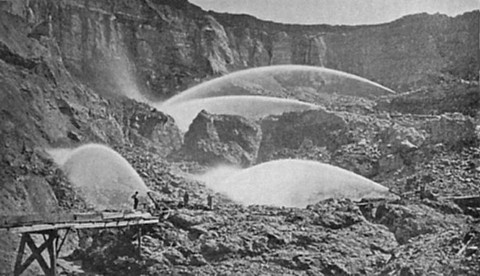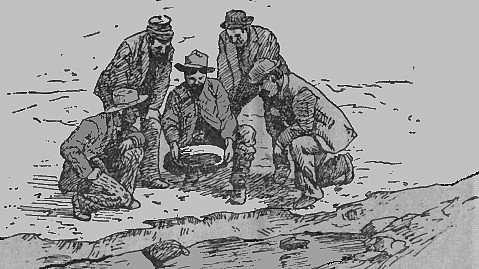My partner and I found nothing to suit us, and started for the Calaveras river diggings, with which we were familiar. We passed through Mokelumne Hill, which at that time consisted of a few store tents. A number of miners were working in the gulches and hill claims, and doing well. Upon reaching the Calaveras river we opened a claim which paid handsomely. The gold of this river was all scale gold, uniform in size and shape, and had that soft, bright color which makes scale gold so pretty and attractive. I rocked the cradle and my partner picked and carried. One morning, when it was my turn to cook, I prepared the batter for the flapjacks, and placed the pan inside the tent. I had used all the flour we had in preparing this batch of batter, and was therefore extra careful in placing it in a safe place. I then went down to the claim, where Jack, my partner, had been getting out a lot of dirt to put through the rocker. When we had washed twenty-five or so buckets of earth, I started back to the tent to cook our breakfast, Jack in the meantime stripping more ground. As I came towards the tent I was confronted with a horrible sight. There stood before me a jackass belonging to a Sonoranian camp down the river. He was a picture to behold. His face was all covered with batter, and attenuated streams of it trickled down from his ears to his chin and hung below it in long threads coming together to a point, the whole forming a beard which the Patriarch of Alexandria would have envied. I realized at once that all my batter was gone, and that our breakfast would resolve itself into a barmecidal feast. I was furious. I rushed to the tent. The pan was covered with dirt, and the ground around was plastic with my precious batter. I seized a cord and tied the burro to a tree, and then battered that burro until he made the welkin ring with his strident notes. We breakfasted on coffee and a slice of bacon alone that morning, and spent the rest of the day in going five miles to the nearest trading tent to get a bag of flour.
My partner was an Irishman. He was a big, strong man, and so considerate of me that when there was any unusually heavy work to be done in the claim he would do it himself. My protestations against this kind of treatment were not very loud at first, but they became feebler and feebler, until I doubt if at last they were at all audible. We were sitting in front of our tent one afternoon when a splendid cavalcade rode up. The leader was finely mounted on a large, American horse. Out of the holsters to his saddle protruded the ivory handles of two five-shooters. There were three other horsemen with him. When they rode up their leader accosted me and said with a consequential air, that he was Col. Woodliff, the collector of foreign miners' taxes. A law had been enacted at the first Legislature imposing a head tax of $16 per month upon all foreigners working in the mines. He wanted to know how far it was to the camp down the river where quite a number of Frenchmen were working. I told him. He then looked at my partner Jack and asked him if he was an American citizen.
I noticed that Jack took a
prejudice to the tax-collector as soon as he saw him, and when he learned
from him the mission he was on, Jack's dislike became stronger. So I was
somewhat prepared for Jack's reply, which was : "It's none of your dód
business."
"I'll show you whether it's any of my dód business or not," said Col.
Woodliff, as he seized a revolver from one of the holsters and started to
dismount. Jack ran into the tent, and as soon as Col. Woodliff reached the
ground, my partner, with his pistol stood ready to meet him. This was
unexpected by the Tax-Collector, and although he was a brave man he
evidently thought it undignified to place his life in peril with such an
adversary.
"I'll give you as good as you can send," said Jack. "I asked you a civil
question," said Col. Woodliff; "why did you not answer it civilly?" Jack was
about to make a characteristic reply when I went to him and begged him not
to further exasperate the Collector, but let me talk for him. "All right,"
he said, "you answer for me, and I'll let the thing drop; but I would like
to clip the feathers of that popinjay."
I told Col. Woodliff that my partner considered his question impertinent,
and he answered as he felt, because he thought he had no right to put it. In
the meantime one of Woodliff's assistants held quite an earnest conversation
with him. This man's name
was Gasse and
he was the Colonel's Spanish interpreter. By this time Woodliff had cooled
down, and said he was sorry that he had framed his question in a way that
gave offense. I spoke for Jack and replied in a conciliatory speech, which
Jack didn't like to father, but did all the same by saying that what I had
said expressed his sentiments. I soon learned that there was a reason for
Woodliff's change of temper. Besides the fact that he did not wish to risk
his life in so unnecessary a brawl, he had come to our tent to get me to go
with him to the French camp as interpreter. He asked me if I would do so,
and after we had settled upon certain preliminaries, I carried out my
agreement.
Jack ever after held Woodliff in the utmost contempt, and always insisted that he lacked "sand." But Jack was wrong. Col. Woodliff was not devoid of courage. He had made a good record in the Mexican War, and was always ready to go out with any gentleman who had a difference with him. Indeed he ended his career a few years afterwards in a duel with Ajax Kewen, brother of Col. E. J. C. Kewen. They fought with rifles back of Oakland, and Woodliff fell at the first fire, pierced through the heart by his adversary's bullet. This affair caused Kewen to leave the state. He went to Nicaragua and joined General Walker, and was killed at the second battle of Rivas. Our claim paid good wages during the summer months, especially when the water in the river had reached its lowest point and permitted us to get at the crevices in the center of the stream. Some of these were very rich, and often, as the result of a day's work in these pockets, we would clean up a pound of gold. At length, towards winter, the river began to rise, and we were compelled to work into the bank where we had to strip off from ten to fifteen feet of top earth before we got to the thin layer of pay dirt near the bed rock. The yield was not sufficient to induce me to continue, and I resolved to give up mining, for which I was not well adapted, anyhow, and return to San Francisco.
Gold continued to flow in great quantities into San Francisco from the mines. The northern mining counties were the most attractive, and those counties became so populous that they soon formed the center of the voting power of the state. The mines on the American, Feather and other northern rivers and their tributaries were rich and numerous. Shasta had become a notable county for the exploitation of the precious metal, and Siskiyou and Yreka loomed up as important gold-producers. El Dorado, however, was at the head of the great yielding mining counties, and had the largest population of any county in the state. Hangtown, as Placerville was then invariably called, was the center of the richest gold region in California. It was by far the most flourishing town in the mountains. It had hotels, churches and newspapers, and The Democrat, established by D. W. Gelwicks and W. A. January about that time, was for many years the ablest and most influential journal, outside of Sacramento and San Francisco, in the State.
In the fall of 1851, H. A. De Courcey, Henry Hamilton and myself bought a printing outfit and started with it for Mokelumne Hill, which, through the discovery of rich mines in its vicinity, had grown to be a large and nourishing camp. When we reached the Hill with our press I marvelled at the change that had taken place in a little over a year. There was evidence of prosperity on every hand. On Sundays the miners flocked to the Hill, and the streets were almost impassable with the crowds that blockaded them. Business was booming, and at night the gambling saloons and fandangos were the centers of attraction. Adams Express Office was buying gold from the miners in prodigious quantities. The output from the deep diggings in the adjoining hills was tremendous. The gold was coarse, and nuggets, or chispas, as they were called, weighing from one ounce to one hundred and twenty ounces - the latter, of horseshoe shape, was the largest ever brought into camp - gave proof of the richness of the diggings.
Lumber for building purposes was scarce and very dear. We found at one of the stores a large lot of sheet iron which the merchant had bought to supply the miners with screens for their Long Toms. The demand for it had fallen away, as other methods of separating the gold had been found more suited to the mines of this vicinity ; so we bought all the sheet iron he had, and covered the frame of our office building with it. On the 18th of October, 1851, we issued the first number of the Calaveras Chronicle, and that paper still lives, having been consecutively published under its original name for a longer period than any other newspaper in the state.


